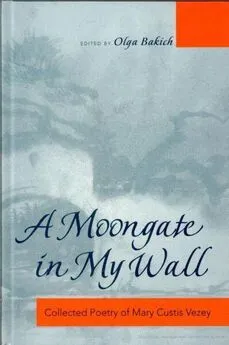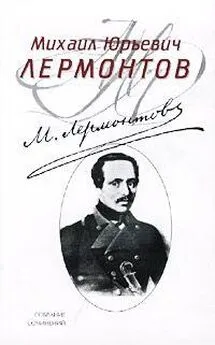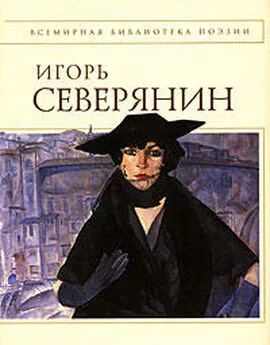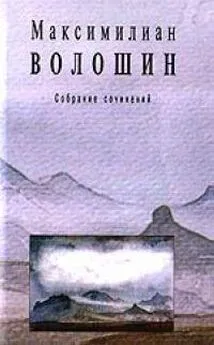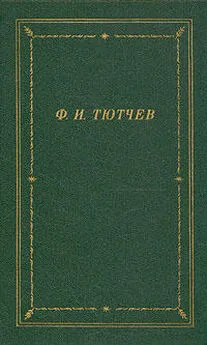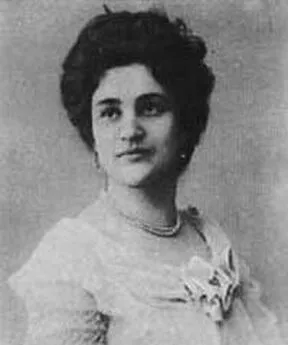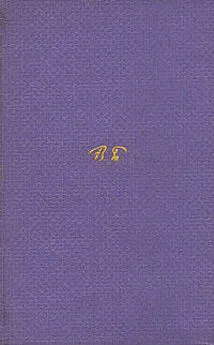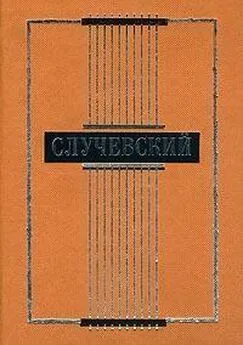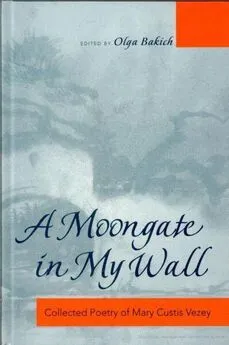Мария Визи - A moon gate in my wall: собрание стихотворений
- Название:A moon gate in my wall: собрание стихотворений
- Автор:
- Жанр:
- Издательство:Peter Lang Publishing, Inc.
- Год:2005
- Город:New York
- ISBN:0-8204-7837-7
- Рейтинг:
- Избранное:Добавить в избранное
-
Отзывы:
-
Ваша оценка:
Мария Визи - A moon gate in my wall: собрание стихотворений краткое содержание
Мария Визи (1904-1994) – поэтесса «первой волны» русской эмиграции. Данное собрание стихотворений, изданное в США, под редакцией Ольги Бакич, наиболее полное на данный момент собрание ее поэтических произведений и переводов.
Издание состоит из 4 частей и включает в себя:
1. Три опубликованных сборника М. Визи: 1929, 1936 и 1973 гг.
2. Стихотворения, не вошедшие в сборники, написанные на русском языке.
3. Стихотворения, не вошедшие в сборники, написанные на английском языке.
4. Неопубликованные переводы
Вступительная статья и комментарии на английском языке.
A moon gate in my wall: собрание стихотворений - читать онлайн бесплатно полную версию (весь текст целиком)
Интервал:
Закладка:
The street lamps shed their meager light,
mist wove its wisps about the town,
a chilly twilight shuttered tight
all windows, drawing curtains down.
Then, growing white, not vapor-soft
but heavy, like a lowered load,
dusk let a fragile hoarfrost waft
onto the sidewalks and the road.
November midnight: winter's eve,
a helpless longing, taut distress
of autumn strings in mute reprieve,
leave-taking, but without redress…
A sketch from nature? — No: the time
was filled with flowers, springlike-bright,
when suddenly the poet's mind
envisioned this November night.
About him warm th and sunlight shone,
young foliage gleamed, birds flitted, gay,
everything bloomed, — his soul alone
had left this blossoming of May.
He roamed along deserted roads,
where street lamps shed their meager light,
where mist in pungent smoke-rings rose,
where hoarfrost tinged sidewalks white.
5 Dec. 1967
650. Василий Сумбатов (1893–1977). Памяти юности [306] From the antology Содружество, Washington, 1966.
We parted at an early date, —
youth, — in the blackest year of war,
though we had been fast friends before,
still, friendship cannot conquer fate.
Our parting came at night, when skies
were dark above the steppe. Your way
was down the trail to yesterday,
and never once you raised your eyes.
Night quenched the heat, and scattered far
the glare of sunset; and the grass,
its strings by twilight winds harassed,
moaned in the steppe like a guitar.
And from afar I could discern
a voice that sang for me alone
that all my happy days were gone,
that you were never to return.
1967
651. Юрий Терапиано (1892–1980). «Куда ни погляжу, везде…» [307] Poem not found in a collection of this poet, presumably translated from a publication in a Russian emigre newspaper.
No matter where I look, I find
dimensions perfect everywhere:
a star is wondrously designed,
crystals are regular and fair.
Foolish, the beating heart, alone,
is not concerned with star or beam;
it will not cease to long and moan,
it's built on quite a different scheme.
[1960s]
652. Юрий Терапиано (1892–1980). «Поднимись на высокую гору…» [308] Poem not found in a collection of this poet, presumably translated from a publication in a Russian emigre newspaper.
Climb atop of the loftiest mountain,
gaze about from the peak where you stand
toward the sheen of the sunset in autumn,
and the sweep of the far land.
There is soundless music around you,
contemplation and stillness are deep.
It is evening. Mountain ranges
darken, waiting for quiet and sleep.
[1960s]
653. Марина Цветаева(1892–1941). «Черная, как зрачок, как зрачок сосущая…»
Black, like the pupil of an eye, like the pupil, sucking
light — I love you, vigilant night.
Give me voice to sing of you, oh original mother
of songs, holding the reins of four winds in your palm.
Calling you, glorifying you, I am only
a sea-shell, where the sound of the ocean has not yet been stilled.
Night! I've already looked long enough into the pupils
of man! Now reduce me to ashes, oh black sun, — night!
[1960s]
654. Марина Цветаева (1892–1941). «Знаю, умру на заре! На которой из двух…»
I know I will die at dawn, or at sunset — which of the two,
at which of the two — this cannot be foreordained!
Oh, if it only could be that my torch would be dimmed
both at sunset and sunrise, together, at once!
Dancing I walked over Earth! — the sky's own daughter!
Full of roses, my apron! Never a broken twig!
I will die at sunset or dawn! God won't send
the night hawk for my soul — the soul of a swan!
Moving the unkissed crucifix gently aside with my hand,
I will rush toward the generous sky for the ultimate greeting.
A slit of the dawn — and a slit of my smile in reply…
… In the hiccough of death, a poet still, — I!
[1960s]
655. Марина Цветаева (1892–1941). «На кортике своем: Марина…»
On your dirk you etched «Marina»
when rising for the strife.
I was the first and only one
in all your splendid life.
I see the army boxcar hell,
that night, your radiant face…
Your curl I scattered to the winds,
your patch I laid in a secret place…
[1960s]
656. Марина Цветаева (1892–1941). «Кто уцелел — умрет, кто мертв — воспрянет…»
Не who survived will die, who died — will rise,
and when recalling olden days, a son
will ask «Where were you?» — like a roll of thunder,
so will answer thunder, «On the Don».
«What did you do?» — «We merely suffered tortures,
then we grew weary and lay down to sleep».
And pensively the sons, opposite «Duty»
will enter «Don» into the book they keep.
[1960s]
657. Марина Цветаева (1892–1941). «Идет по луговинам лития…»
Above the meadows rings a requiem mass.
The secret book of Russia's Genesis
where all Earth's fates are hidden has been read
right to its end and has been tightly closed.
And round and round the steppe winds rove and scour
«Russia! Oh martyr! Rest in peace!»
[1960s]
658. Марина Цветаева (1892–1941). «Если душа родилась крылатой…»
If a soul is born with wings —
what does it care about earthly things!
About Genghis-khan and about his Horde!
I've but two enemies in this world,
twins who have ever together stood:
the hungry ones' hunger, the fed ones' food.
[1960s]
659. Марина Цветаева (1892–1941). «Белье на речке полощу…»
I wash my laundry in the brook,
I grow two flowers in my nook.
I cross my heart when church bells call,
I fast when there's no food at all.
As soft as silk — my soul, my hair.
My reputation must be fair.
To do my duty is my belief.
But oh, I love you — wolf and thief!
[1960s]
660. Марина Цветаева (1892–1941). «Ты дал нам мужества…»
You gave us courage
a hundredfold —
let the worlds turn —
we will keep our hold;
and ribs so strong
they'll stand all pain
and remember the Kingdom
even when slain;
You lifted Your likeness
to the sky
since Your faith in Your likeness
wouldn't die.
They give us breath
and give us sweat
enough to bear
Your bounty yet!
[1960s]
661. Владислав Ходасевич(1886–1939). Музыка [309] From the collection Тяжелая лира, Berlin, 1923. Variant in the thirty-seventh line in the manuscript: «but doesn't want to keep too from hearing».
All night a snow-storm raged, but day broke calm and clear.
A Sunday laziness pervades my body still,
the Sunday service in the nearby church
is not yet over. As I step outside
into my yard, how small things are: the house,
the smoke that curls above the roof! The rose —
— and-silver of the frosty air — it lifts
its pillars over houses towards the sky's
high cupola, like wings of giant angels.
Sergei Ivanych, my fat neighbour, too,
all of a sudden seems so very small.
In high felt boots and lumber-jacket. Firewood
is scattered all around him in the snow.
As with both hands, and obviously straining,
he lifts his heavy ax above his head,
and yet the striking of his hits
is not too loud: the sky, the snow, the cold
absorbs the sound … «A happy Sunday, neighbour».
Says, «Ah, greetings». So I too set out
my firewood in my yard. He hits, I hit! But soon
I tire of chopping and 1 straighten up
and say to him: «Hold on a minute, now,
— I hear some music?» Sergei Ivanych
stops working, lifts his head a little way
and listens, though he doesn't hear a thing.
«You just imagined it», he tells me. «Really —
just listen hard. To me it sounds quite clear!»
Again he listens. «Could it be perhaps
a military funeral? Yet truly
I still hear nothing». But I don't give up:
«Good gracious, now it's perfectly distinct.
The music seems to come from up above.
Violoncello… and perhaps a h arp …
How beautifully played! Please stop that noise».
And once again my poor Sergei Ivanych
stops splitting wood. He doesn't hear a thing
but doesn't want to interfere with me
and doesn't wish to show me his annoyance.
Amusing: stands there in his yard, afraid
to interrupt the silent symphony.
I finally take a pity and declare:
«It's over». And again we both pick up
our axes. Bang! And bang again! The sky
is still as high above, and as before
feathery angels shine and glimmer in it.
7 Sept. 1967
Chinese into Russian (from English translations)
662. Anon. Riding the Moonlight («С высокой верхушки горы звезда…») [310] Comment by Mary Vezey: «From the Sung Collection.»
С высокой верхушки горы звезда
скатилась на запад — далеко, туда.
Внизу, где блеснувшая речка видна,
восточная выплыла тихо луна.
Растрепан, по ветру откинув полу,
я еду в прохладную добрую мглу.
Ласкающий ветер несет аромат,
и ярко деревья росою блестят.
Роняя виденья с ветвей при луне,
вздохнут они лютне, зачем ты во сне?
Беззвучно на лютню рука упадет.
«Ведь я твоя лютня» — мне сердце шепнет.
Интервал:
Закладка:
